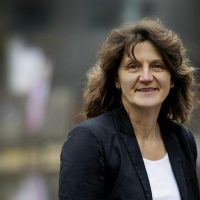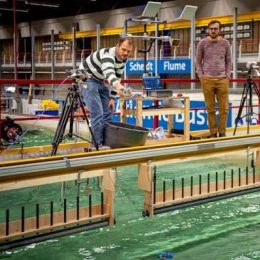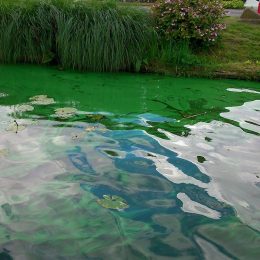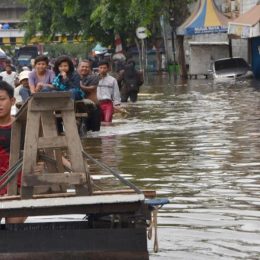Pollutants and their consequences for water quality and health
Pollutants have consequences for all sorts of functions in the water and soil system. Because people live and work in heavily populated deltas, water and soil are becoming increasingly polluted. Both man-made – anthropogenic – substances, and naturally occurring substances such as nitrate and phosphate, are entering our water and soil systems in excessive amounts. That process disrupts the natural equilibrium of the ecosystem and harms biodiversity. It can also have direct effects on our health.

The World Health Organization and, closer to home, the European Union and the Dutch government authorities are warning about the increase in the levels of these substances in our environment. They are working on guidelines and regulations to combat pollution. Deltares supplies knowledge about dissemination and emissions, breakdown, possible solutions and the removal of the pollutants.
Anthropogenic and natural pollution
Hormones, drug residues, plastics and antibiotics, but also PFAS, are examples of the substances that contaminate the sources of our food and drinking water, and leisure areas, via the air, water and soil. We therefore come into contact with these anthropogenic substances both unintentionally and often without being aware of it.
Because new substances are constantly emerging, it is often impossible to stop them entering the environment. Nor is it always clear (yet) what impact these substances will have on health and biodiversity. We do know that some of them are substances of concern or serious concern.
The fact that people change the balance of natural substances such as nitrate and phosphate is also problematic because the health of people and nature depends on that balance.
Climate change and major transitions in society – as in the fields of energy, agriculture, the circular economy and sustainability – also affect the dissemination and amounts of natural and anthropogenic substances.
Tackling the dissemination of pollutants
Our clients, such as water authorities, ministries and drinking water companies, therefore want to know how we can reduce levels of pollutants. For example by furthering natural breakdown processes. A major question is also what should be tackled first to combat pollution, restore ecosystems and reduce water-related health risks. Answering those questions requires an understanding of the effects the substances have, where, and the level of concern.
We help our partners with research into how the substances spread and the problems they can cause, and we contribute knowledge for the purpose of setting standards. By supplying knowledge about the toxicity and the mobility of substances, we help with decisions about what to tackle first.
We want our research to prevent problems in the future. By making decisions now about which substances you allow into the environment, or not, you can make sure you don’t run into extra difficulties ten or twenty years down the line. As with PFAS at the moment.
Hilde Passier, expert groundwater and soil quality
The water and soil system
The focus of the Deltares research into pollutants is to develop knowledge about how they pass through the water and soil system. We start at the point where they enter the system and follow them to where they leave it, and where they affect sources of drinking water or ecosystems, from the source to the sea. We use data, system knowledge and models for this work.
Questions about pollutants start with emissions: How much enters the water? What happens when the substances get into the water, and when they are transported with the current and move into the surface water? How and where are substances captured and broken down? Which substances enter the sea, and in what quantities? The same questions apply to the soil. And to seepage into groundwater, where pollutants are transported by the groundwater currents.
Natural breakdown of pollutants
Some substances are broken down along the way and are definitively eliminated. Others appear elsewhere. The question here is what form they then take, and what impact that has on the ecosystem and, ultimately, human health. Deltares researches that entire process and we use our knowledge to try and reduce harmful effects.
We conduct experiments to look at faster breakdown processes. For example, there are bacteria that find contaminants particularly appetising and that are not harmful for humans and nature. Our researchers conduct experiments to encourage those natural processes. The aim is to eliminate the pollutants before you re-use the water for drinking water, agriculture or industry. And to minimise the impact on biodiversity.
Several types of research converge:
- Data and model studies: we analyse and process datasets, and calculate concentrations in water and soil with hydrological, chemical and ecological models. We simulate the present and future for a range of scenarios.
- Lab studies: On the basis of these studies on the scale of a lab table, an aquarium or slightly larger experimental arrays, we supply our clients directly with data. Or we use that work to refine our models. This allows us to calculate how the substances enter the water from the source and how they move in the water. And to identify possible ways of eliminating them from the water and soil.
- Field studies: After research in the lab, we scale things up and conduct field studies. We also get local people involved in supplying data. This ‘citizen science’ raises awareness of the importance of water quality and helps to validate knowledge.

Laboratory studies at Deltares
Pollutants can be tackled only by sharing knowledge and working together
In all Deltares research fields, we get knowledge partners and stakeholders involved to conduct and accelerate research efficiently. ‘And that is certainly needed because the amounts of substances, and therefore the urgency, are still increasing. The transitions referred to also open up opportunities,’ says Deltares expert Hilde Passier. ‘The agendas are complex, and the links between them mean that we have to combine our knowledge with the knowledge of other organisations.
‘Because water and the subsurface are everywhere and they can both establish connections and provide guidance. This results in both opportunities and restrictions that we can address effectively if we have the right knowledge. Developing the right knowledge is crucial, and good cooperation helps. We think it is important for all the knowledge required to land well at the relevant parties and for us to present it in a coordinated way. That is the challenge faced by Deltares.’
Zero pollution and a circular approach
Pollution does not stop at national borders and so it is important to act internationally as well. This is happening in Europe with Zero Pollution, the EU Soil Directive and the Green Deal. These European initiatives are transformed into national policies in member states. Basically, the aim is to release no more harmful substances into the environment. That means starting at the source and opting for a circular approach. Deltares advises policymakers about how to tackle pollutants from the perspective of the integral system. This involves questions such as:
- Where are the best opportunities to intervene in the system? Examples include encouraging breakdown processes at a location in a wetland to reduce concentrations of diffuse substances so that they inflict less damage.
- Where are the pollutant hot spots and where is it best to clean them up to prevent further dissemination?
- How can different functions be combined in an area so that the effects of any pollutants are taken into consideration properly and, if possible, reduced?
Our clients have many choices to make. With our knowledge and research, we help them to do that in the best possible way on the basis of a qualitative perspective on water and soil.







